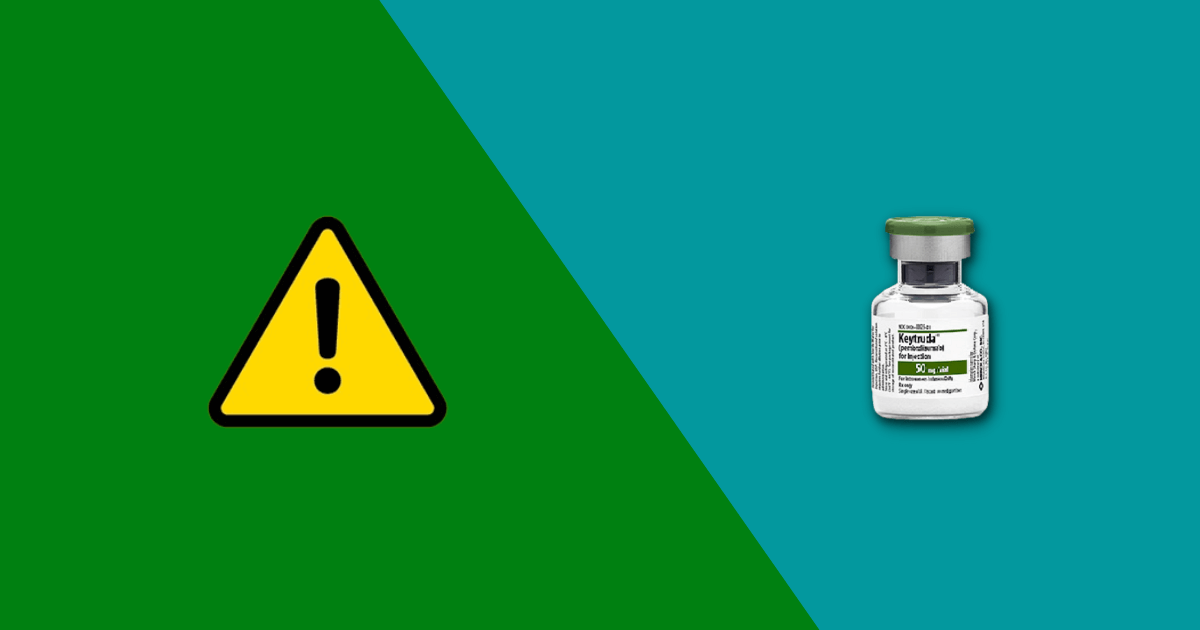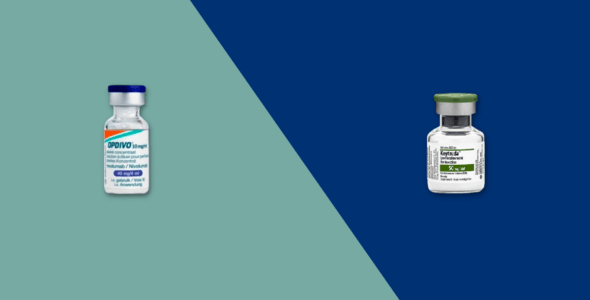Keytruda side effects and how to avoid them
Table of contents
Keytruda is a brand-name medication that is manufactured by Merck. It is classed as a type of immunotherapy treatment option for multiple types of cancer. Keytruda is a type of cancer treatment that uses the body’s own immune system to better find and attack cancer cells. While Keytruda is generally well tolerated, there are some potential side effects that people should be aware of. The most common side effects of Keytruda include tiredness, constipation, and decreased appetite. Less common, but more serious side effects, can include liver and kidney problems and infusion reactions.
Learn more about the side effects of Keytruda and what you can do to avoid them.
What is Keytruda (pembrolizumab)?
Keytruda is a medicine used to treat different types of cancers. You may be prescribed Keytruda if you have:
- Skin cancer called melanoma or Merkel cell carcinoma (MCC)
- Non-small cell lung cancer (NSCLC), or small cell lung cancer (SCLC)
- Head and neck squamous cell cancer (HNSCC)
- Classical Hodgkin lymphoma (cHL)
- Mediastinal B-cell lymphoma (PMBCL)
- Urinary tract and bladder cancer called urothelial carcinoma
- Microsatellite instability-high (MSI-H) or a mismatch repair deficient (dMMR) solid tumor
- Gastric or gastroesophageal junction (GEJ) adenocarcinoma
- Squamous cell carcinoma of the esophagus
- Cervical cancer
- Triple-negative breast cancer (TNBC)
- Hepatocellular carcinoma
- Renal cell carcinoma (RCC)
- Endometrial carcinoma
Keytruda is often used when your cancer has spread (metastatic), if it can not be removed by surgery, it hasn’t responded to chemotherapy, or if your cancer tumors have certain abnormal genes. Keytruda can be used alone, or it can be used alongside other treatments like chemotherapy or radiotherapy. Rather than being a type of chemotherapy or radiotherapy, Keytruda is an immunotherapy that works with your immune system to help you fight your cancer. It is given through a drip into one of your veins (intravenous), usually under the supervision of a doctor or nurse. Keytruda can be used alone, or it can be used alongside other treatments like chemotherapy or radiotherapy.
The active ingredient in Keytruda is called pembrolizumab. It works by helping your immune system to fight cancerous tumors. Some cancerous tumors protect themselves from your immune system by producing a protein called programmed cell death protein 1 (PD-1). This protein forms on the outside of the tumor turning your immune system’s T cells off. This stops your immune system from attacking and destroying the tumor. But pembrolizumab removes this protection. Keytruda attaches itself to the PD-1 proteins stopping them from working. This allows your immune system to fight the cancerous tumor.
Keytruda dosage
Keytruda is available as 50 mg lyophilized powder for injection in single-dose vials for reconstitution and as 100 mg/4 mL (25 mg/mL) solution in single-dose vials.
Your dose of Keytruda will be based on the condition you are being treated for but is typically 200 mg every 3 weeks. Your doctor may increase your dose if needed.
You are advised to read the full prescribing information provided with this medicine for drug information and patient information, and always speak with your healthcare provider for medical advice about any changes to your dose so they can monitor and evaluate your condition.
Keytruda side effects
The most common possible side effects of Keytruda in clinical trials compared to placebo include:
- When used alone – tiredness, pain, including pain in muscles, skin rash, diarrhea, fever, cough, decreased appetite, shortness of breath, trouble breathing, constipation, bones or joints pain, abdominal pain, nausea, and low levels of thyroid hormone
- Common side effects of Keytuda, when given with other medication – tingling or numbness of the arms or legs, hair loss, low red blood cell count (anemia), tiredness, nausea, low white blood cells, diarrhea, high blood pressure, decreased platelets, constipation, joint pain, vomiting, urinary tract infection, skin rash, low thyroid hormone levels (hypothyroidism) and decreased appetite
Keytruda can cause more serious side effects, including:
- Severe infusion reactions
- Rejection of a transplanted organ
- Skin reactions – rash, itching, skin blistering or peeling, painful sores or ulcers in your mouth, nose, throat, or genital area
- Fever or flu-like symptoms
- Lung problems (pneumonitis) – chest pain, shortness of breath, a new or worse cough
- Intestinal problems (colitis) – diarrhea or more bowel movements than usual, stomach tenderness and pain, stools that are black, sticky, or have blood or mucus in them
- Liver problems (hepatitis) – pain on the right side of your stomach, yellowing of your skin or the whites of your eyes, dark urine, bruising or bleeding more easily than normal
- Kidney problems – changes in the amount or color of your urine
- Hormone gland problems (particularly the thyroid, pituitary, adrenal glands, and pancreas) – weight loss or weight gain, feeling more hungry or thirsty, increased sweating, a rapid heartbeat, feeling cold, hair loss, feeling very weak, dizziness or fainting, headaches that will not go away
- Changes in vision
- Severe muscle weakness, persistent muscle or joint pains
If you experience serious side effects, stop taking Keytruda and seek medical attention immediately. You are encouraged to report negative side effects of prescription drugs to the FDA. Visit www.fda.gov/medwatch, or call 1-800-FDA-1088.
Keytruda drug interactions
Keytruda can interact with other medications including:
- Corticosteroids – betamethasone, dexamethasone, prednisolone
- Immunomodulatory drugs – lenalidomide, thalidomide
Before taking Keytruda, be sure to tell your doctor about all of the medications you are taking to ensure they are safe to take at the same time.
Keytruda warnings & precautions
Don’t take Keytruda if:
- Are allergic to the active ingredient pembrolizumab
- Are allergic to any of the other ingredients in Keytruda (these will be listed in the leaflet which comes with the medication)
Talk to your doctor before taking Keytruda if you:
- Are taking any of the medications that could affect your immune system and interact with Keytruda
- Have an autoimmune disease, like Crohn’s disease, ulcerative colitis, or lupus
- Have pneumonia or inflammation of your lungs (pneumonitis)
- Were previously given a medication called ipilimumab and you experienced serious side effects
- Have had an allergic reaction to other monoclonal antibody therapies
- Have had any liver problems or liver damage
- Have had any kidney problems or have kidney damage
- Have HIV or AIDS
- Have had an organ transplant
- Have had a bone marrow transplant that used donor stem cells
- Have a condition that affects your nervous system, such as myasthenia gravis or Guillain-Barré syndrome
- Are pregnant or are planning to get pregnant
- Are breastfeeding or are planning to breastfeed
You should always check with your doctor or pharmacist before taking any medication, including Keytruda, to make sure it is safe for you.
Other warnings you should know about
Infusion reactions can sometimes be severe or life-threatening. Signs and symptoms may include chills or shaking, itching or rash, flushing, shortness of breath, dizziness, feeling lightheaded, fever, and back pain
How to avoid Keytruda side effects
The best way to avoid side effects is to take Keytruda as directed by your doctor. Follow your doctor’s instructions carefully and do not take more or less than prescribed.
If you experience any side effects, talk to your doctor or pharmacist. They may be able to recommend ways to help reduce or prevent some of the side effects.
1. Stick to the recommended dosage
Take your prescribed dose of Keytruda that has been recommended by your healthcare professional. Do not take more or less than prescribed.
2. Monitor your blood sugar levels
If you have diabetes, it is important to monitor your blood sugar levels closely while taking Keytruda. Check your blood sugar levels as directed by your doctor and report any changes to your doctor immediately.
3. Drink plenty of fluids
Drink eight to 10 glasses of water or fluids every day to help prevent dehydration, which can make side effects worse.
4. Avoid alcohol
Alcohol can cause side effects similar to some of Keytruda’s. These include diarrhea, tiredness, and nausea. Alcohol may make these side effects worse during Keytruda treatment.
5. Don’t skip meals
Eating regular meals and snacks will help to prevent low blood sugar levels (hypoglycemia).
6. Know the signs and symptoms of side effects
Signs and symptoms of side effects include diarrhea, constipation, and abdominal pain. If you experience any of these symptoms speak to your doctor for medical advice.
7. Monitor your weight
Keytruda may cause weight loss. If you experience this while taking Keytruda, get medical advice from your doctor.
8. Tell your doctor about all medications you’re taking
Be sure to tell your doctor about all other medications you’re taking, including over-the-counter drugs, vitamins, and herbal supplements, as they can interact with Keytruda.
9. Get regular medical checkups
If you have side effects it is important to get regular medical checkups and monitor your medical conditions. Your doctor will monitor your condition and may adjust your dose of Keytruda as needed.
Medically reviewed
A medical professional has reviewed this article.


Jamie Winn, PharmD
Jamie Winn, PharmD
Dr. Jamie Winn received his Doctor of Pharmacy in 2002 from the University of South Carolina College of Pharmacy, Columbia, SC. Jamie is a medical reviewer for NiceRx.


